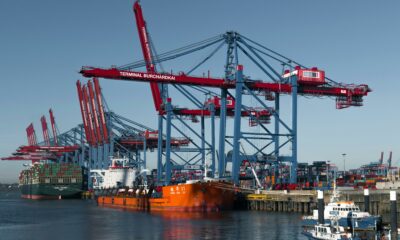Business
Fewer South African Companies Going Bankrupt Despite Weak Economy

South Africa is seeing a steady decline in company liquidations, offering a glimmer of resilience amid broader economic uncertainty. According to Statistics South Africa, the number of liquidated entities dropped by 8% year-over-year as of March 2025.
This improvement comes despite the country’s sluggish GDP growth, which reached only 0.6% last year. The International Monetary Fund (IMF) recently cut South Africa’s 2025 growth forecast by 0.5 percentage points, projecting just 1% growth—highlighting the tough road ahead for local businesses.
Close Corporations Show Biggest Drop
The biggest improvement was seen in close corporations, generally smaller businesses, which saw 21 fewer liquidations. However, larger companies experienced a slight increase, with 10 more liquidations compared to the same period last year.
Overall, the total number of liquidations dropped by 3.1% in Q1 2025 compared to Q1 2024, continuing a gradual downward trend observed since 2015—with a few spikes during major economic disruptions.
“While the broader economy continues to face challenges, there’s a notable level of resilience among small to medium-sized businesses,” said an economic analyst familiar with the data.
Financial and Business Services Most Affected
In March, the sector hit hardest by liquidations was finance, insurance, real estate, and business services, with 53 company closures, the majority of which (44) were voluntary.
This was followed by the trade, catering, and accommodation sector, which typically includes small and medium enterprises vulnerable to inflation and fluctuating consumer demand.
Global Headwinds and Trade Tariffs Loom
The IMF’s downgrade of South Africa’s outlook also stems from global geopolitical pressure, notably US President Donald Trump’s new tariff policy. Although implementation was delayed by 90 days, South African exporters face a looming increase in US import duties—from 10% to 30%—on a wide range of products.
This uncertainty adds pressure to already constrained businesses, especially those dependent on foreign markets.
Business Rescue Offering a Lifeline
Part of the reason for fewer formal liquidations may be the increased use of Business Rescue, a legal mechanism introduced in 2008 under the Companies Act. This allows struggling companies to suspend debt claims and restructure under the guidance of a business rescue practitioner—rather than go straight into liquidation.
“Business rescue has become a vital option for companies facing insolvency, particularly amid tight cash flows and uncertain policy environments,” according to Werksmans Attorneys.
To qualify, companies must demonstrate that they are financially distressed and likely to be insolvent within six months—but also that there’s a reasonable prospect of recovery.
What This Means for South Africa
While the overall economic picture remains weak, the decline in company liquidations suggests that more businesses are either surviving tough times or leveraging alternatives like business rescue to stay afloat.
It’s a sign that, even in a low-growth environment, adaptability and policy tools can help cushion the blow—especially for small and mid-sized enterprises.
{Source: IOL}
Follow Joburg ETC on Facebook, Twitter , TikTok and Instagram
For more News in Johannesburg, visit joburgetc.com


























